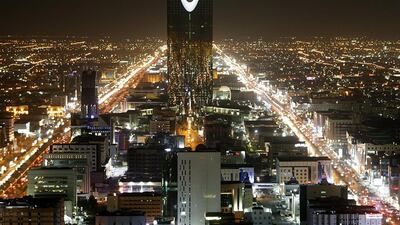Saudi Arabia's sovereign wealth fund said it auctioned 1.4 million tonnes of carbon credits at the Middle East’s first carbon offset auction.
Top crude exporter Saudi Aramco, Olayan Financing Company and Saudi Arabian Mining Company bought the largest number of credits in the auction, the Public Investment Fund said in a statement on Wednesday.
The carbon credits comply with Corsia, a programme run by the International Civil Aviation Organisation, and are registered with Verra, operator of the world's largest registry of carbon credits.
Carbon credits, also known as carbon offsets, are permits that allow companies to emit a certain amount of carbon dioxide or other greenhouse gases. The market for the financial instrument could be worth more than $50 billion by 2030, according to consultancy firm McKinsey.
PIF has joined forces with Saudi Tadawul Group, the holding company that operates the kingdom's stock exchange, to establish the Regional Voluntary Carbon Market Company.
Headquartered in Riyadh, the new company will support regional businesses as they contribute to the global transition towards net zero.
“The company will play an important role in PIF’s wider efforts to drive the investment and innovation required to address the impact of climate change and support Saudi Arabia’s efforts to achieve net zero by 2060,” Yazeed Al Humied, deputy governor and head of Middle East and North Africa investments at PIF, said on Tuesday.
The company’s establishment is a continuation of PIF initiatives to support Saudi Arabia’s green agenda. Earlier this month, it raised $3bn through its first bond issuance as it considers financing or refinancing its investments in renewable energy, energy efficiency, green buildings and clean transport.
Saudi Arabia, the world's biggest crude exporter and the Arab world's biggest economy, is looking to diversify away from oil exports as part of its plan to achieve net-zero carbon emissions by 2060.
The kingdom plans to more than double its target of reducing annual carbon emissions to 278 million tonnes by 2030, Crown Prince Mohammed bin Salman said in October last year. This was up from a previous target of 130 million tonnes.
This year, The Abu Dhabi Global Market teamed up with AirCarbon Exchange (ACX) to create the “world’s first fully regulated” carbon trading exchange and clearing house in the emirate.
ADGM will regulate carbon credits and offsets as emission instruments, and issue licences for exchanges to operate both spot and derivative markets.
While governments globally are pursuing carbon neutral goals, significant investment is required to achieve those targets.

